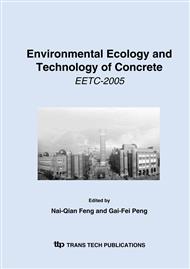p.424
p.432
p.438
p.444
p.451
p.457
p.462
p.470
p.479
Study on Strength and Velocity of Longitudinal Wave of Low-Strength Concrete
Abstract:
A new kind of low-strength concrete is suggested to fill big caves to protect environment and ecosystem. The low-strength concrete have been studied regarding strength, wave propagation, water content, porosity, composition and cemented material by press experiments and sound wave analysis and shear tests. Those results show that: (1) the mechanical characteristics of low-strength concrete is complex; (2) strength of the low-strength concrete comes from interlocking of large-size crushed stones and bond of cement particle; (3) water content has significant effect (more than 30 percent) on velocity of longitudinal wave of the low-strength concrete and has little effect on strength; while effect of porosity of concrete on strength are more than 30 percent; (4) strength of low-strength concrete are controlled by both the content of crust stones and content of cement and a relationship of strength and velocity of longitudinal wave is proposed.
Info:
Periodical:
Pages:
451-456
Citation:
Online since:
January 2006
Authors:
Keywords:
Price:
Сopyright:
© 2006 Trans Tech Publications Ltd. All Rights Reserved
Share:
Citation:


